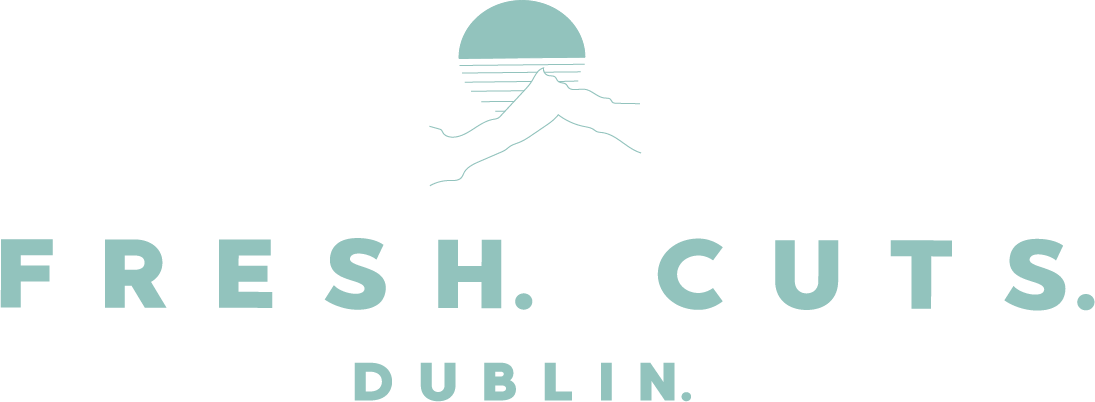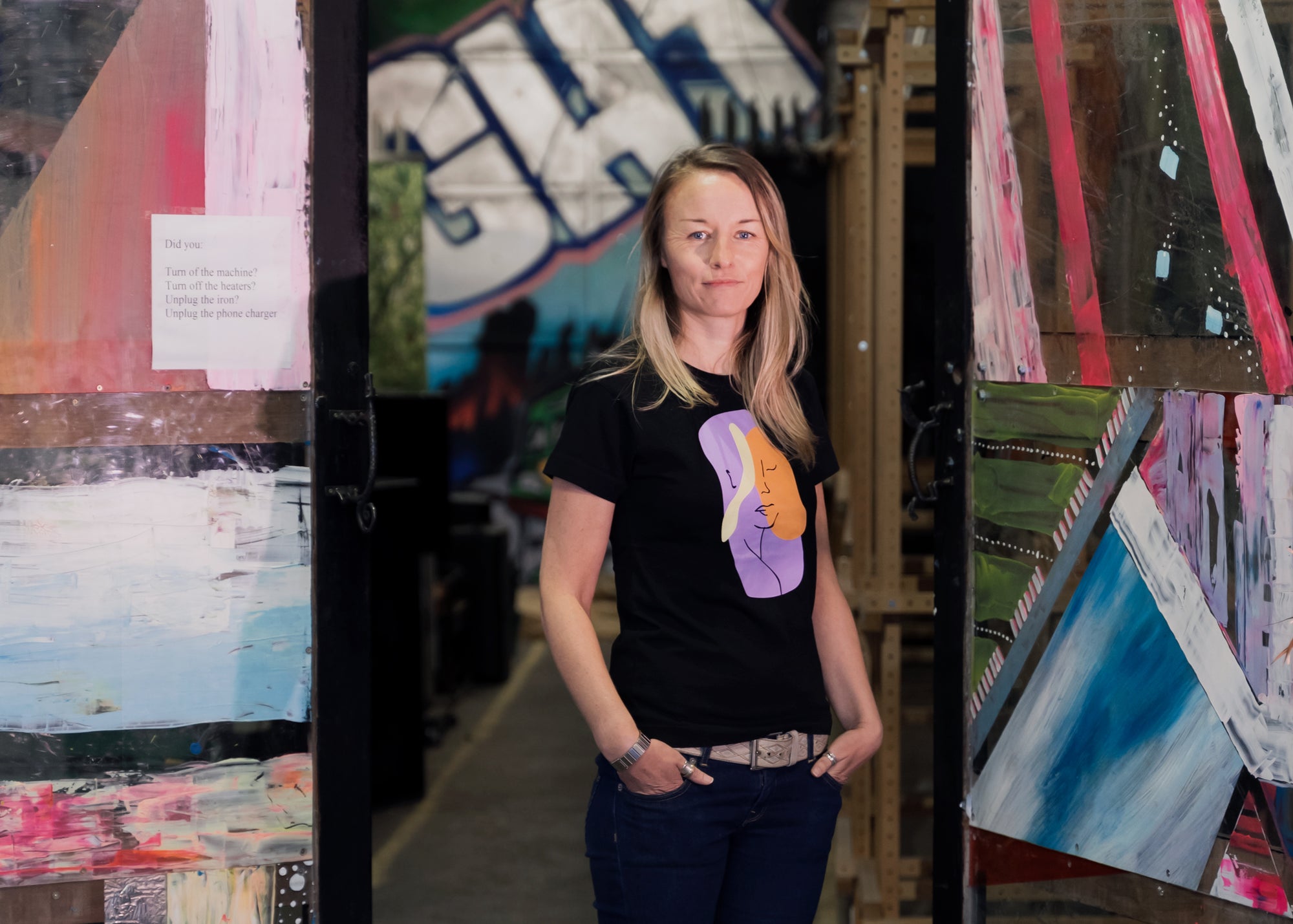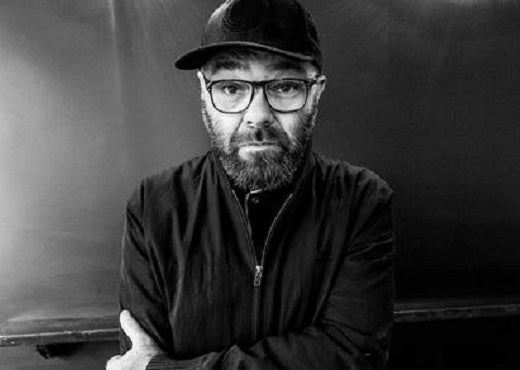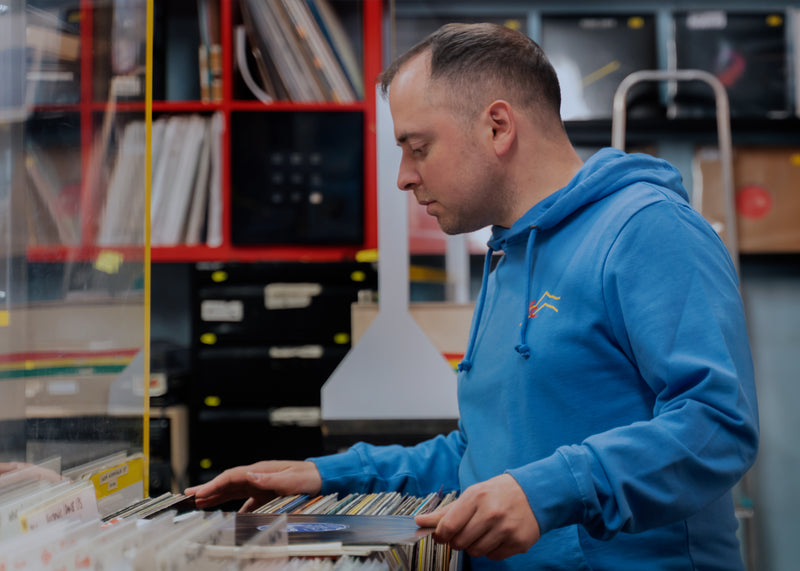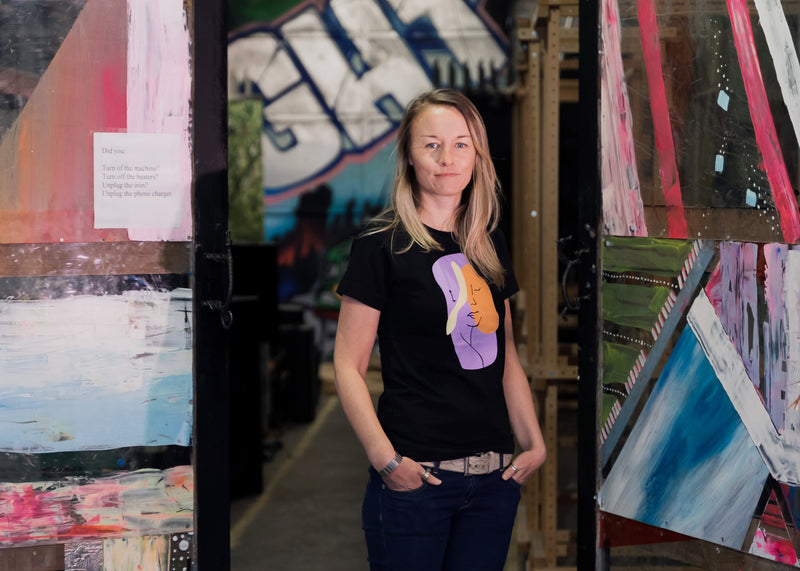
Megan is wearing the abstract faces t-shirt from fresh Cuts
It takes a global pandemic to pin down Megan Best for a chat in the height of summer. Any other year she’d be deep in a field putting together a festival, as operations manager for Body and Soul. She’s also CEO of Native Events, a sustainable event production and solutions company. They’ve taken on the task of trying to transform the Irish Events Industry into a more ‘environmentally regenerative’ model, which keeps her pretty busy.
At Fresh Cuts, we know Megan from the Sustainable Fashion show that Native Events hosted last year, and as an active voice in the industry. She’s co-founder of Attention Attire, a clothing and accessories brand created from salvaged campsite equipment that’s been left behind at Irish festivals. You can hear her in action on Saturday mornings on Dublin City FM, hosting her new weekly radio show, ‘The Green Room’.
We met up at D-Light Studios, a converted woolen mill on Dublin's northside, where Native Events have their headquarters. Originally an abandoned warehouse, it’s now a busy studio space, hosting exhibitions, performances, photography and film shoots and a number of independent businesses. It’s one of the few spaces of its sort remaining in Dublin these days.
“The company was founded out of frustration that Ireland was so behind in terms of trying to implement anything to do with sustainability in the sector,“ she explains.
They began as a consultancy, showing events and festivals how to develop a sustainable infrastructure, in areas like waste, power management, and communications systems. They found that when it came to acting on their recommendations, the things they needed couldn’t be found in Ireland, so Native Events took on that role as well.
“The event industry here didn't have any other suppliers that were doing that at the time...
we had to become this one stop shop for it. We’d rather focus and just be really direct with what we’re doing, but we’re trying to fix an entire sector and an entire industry in one go!”
“I’ve spent so much of my career talking about toilets you wouldn’t believe it’, laughs Megan.
Even now, if you wanted to put on an outdoor event with compostable toilets instead of the nasty chemical portaloos, you couldn’t. “There’s just no supplier in Ireland” she tells us.
“In the UK and in Europe, they’re streets ahead of what we're doing here.”

Megan wearing last light women's crew neck
She thinks they launched at the right time, and the appetite was there. Attitudes have shifted, especially as an increasingly terrified youth get vocal about the need for a planet to grow old on.
“Things are definitely changing within the last couple of years with the David Attenborough effect….Between him and Greta Thornburg, things are actually starting to move!”
The government has made noise about supporting the transition towards a greener sector, and Native Events have already prepared a response. If that’s met by actual policy and investment, there may be hope for the future.
“There's plenty of innovators out there. There's young people that are trying to do things differently, that do understand, and have some really great ideas.”
They’ve been using the time out to pivot and grow the business, with plans to expand out into the broader arts and cultural sectors.
“What's been nice about the lockdown is that it's given us a moment to pause, and develop these other projects,” she tells us. “The idea was always to start with what we know, which is the festival and events industry, and then widen it out, so the lockdown has just accelerated our plans in that direction.”
Since Covid-19 has cancelled live events for the foreseeable future, we ask about her how the industry is coping, and what the future looks like for them.
“We’re a bunch of eternal optimists” she tells us. But...
“It's been very, very tough for a lot of people across the board. The music industry will survive and has started being quite innovative...but for the events industry, it's very difficult to have a live event online, or to stream something, or to engage with people over zoom.”
It’s seasonal work, so some people have lost up to 75% of their income. The more experienced workers may have to move on to different industries, leaving a big skill shortage when things start back.
“There is going to be a huge, huge amount of debt. Some of the big events actually won't survive, I don't think….a lot of the smaller ones will probably be able to get through it because they're used to being in debt, being very independent, and working on a kind of goodwill.”
On the plus side, the industry has come together in the crisis, and started to get active as a community. The Events Industry Association of Ireland was set up a few years ago, which is a great initiative, but “nobody had the time to join because we were way too busy!
Now it’s in full flow, people are talking, and using this time to consider how they function as an industry. “Maybe we’ll unionize, who knows!” she says. “It's about having time to organise, so there's been a lot of positivity in that”
The pressing question on our minds is whether there’s any hope we’ll be back in a field next summer?
Until recently she'd have said no, she tells us, but she’s starting to think that some form of outdoor events may be possible next year. The nature of how we gather will need to change though, and they won’t look like the festivals we’re used to.
“I think that they will have to continue to be socially distant...they're talking at the moment about doing events but banning alcohol.”
“I can see really small intimate boutique events, where people are acting responsibly, and going down not to be part of a machine, or to get mashed, but to appreciate being outdoors and having a bit of crack with each other. I think that might well happen.”
She’s been thinking about what may happen with the Industry as a whole, and looking to ecosystem science for reference. She explains that there are cycles Ecosystems go through, where periods of growth build and then stagnate, until a massive disturbance - a forest fire, or a crash - levels it all.
‘‘That's exactly what's happening now...obviously, for the wider world system, but certainly for the cultural arts and events sector, because we've been hit hardest by the pandemic”
After the forest fire, a new stage starts. “All of a sudden there's a break in the canopy and there’s light getting down to the bottom of the forest, and all of these new species get a chance to come back in - so there's a massive regrowth and reorganization. This is the reorganization phase, when all of the new innovations start to appear, and things get really creative.”
“After the financial crash in 2008 the creativity was abounding in Ireland, and I think that was basically another similar reorganization phase.”
During that time, she remembers people coming together purely to create something new and special; “There was a rebuilding of community and new leaders came to the fore...and I think that's probably what's going to happen again - where people are putting their time, love, and energy into something, not just to earn a buck at the end of the day”
We talk to her about Attention Attire, a definite labor of love that sees a huge amount of work go into salvaging, washing, ironing, coating and pulling apart materials to make them into something new.
“The idea is to raise awareness of the materials that are being left behind, and the fact they have an inherent value…. and that waste is not a word that we should even have in common parlance really.”
In order to be truly circular fashion, they’ve started offering free repairs on their clothes, and when something they’ve made is at the end of its life they ask for it back so they can use it again.
The next step is to reach out to the manufacturers that are creating these materials and talk to them about designing for durability, so they can spend a bit more time being a tent before they become a jacket or wallet. Designing for sustainability needs to happen at all levels.
She makes the point that campsite waste can be a product of poor festival design as much as poor behavior. Overcrowded, badly laid out campsites that are difficult for security to navigate, with people piled in and tripping over, mean tents get trashed. Factor in the miles of walking it takes to get to the carparks on a Monday morning, and you find disposable tents become the sensible choice.
We talk about Dublin, and how it's changed over the years. She feels that It used to have a really strong creative and cultural energy that’s missing now, replaced by the Silicon Dock that’s driven up rents and driven the creatives out. A lot of the venues have closed down and the place has sadly become very homogenous.
“Dublin needs vision from policymakers,” she says. “I think it's incredibly lacking. The planning permissions and decisions that have gone ahead over the past number of years have eroded its cultural identity and I think constantly allowing massive student apartment blocks and hotels has not done Dublin any favours”
We’re wondering if there’s anything that’s come from our experiences this year that we should carry forward with us, to the ‘new normal’
“The time out of life. People giving themselves time and headspace to educate themselves and understand what's going on, and to make more responsible and impactful choices with what they do. That’s a normal I’d like to see, across the board, not just work.
If someone you knew was visiting Dublin for 24 hours, where would you bring them?
Megan's itinerary:
Lunch in the Fumbally
Trot around to hens teeth for a little look
Out to IMMA for a wander
Down to Teelings Distillery for a tour
Capel St - Musashi or Eat Tokyo for dinner
Around to 1661 for a few drinks
Up to Hang Dai then for a bit of a dance
Round off the evening in the vintage cocktail club
The following day, out to Howth for a goosey along the pier and a bowl of chowder :)
